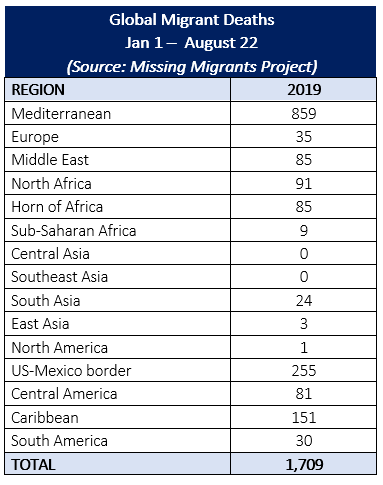-
Who we are
WHO WE AREThe International Organization for Migration (IOM) is part of the United Nations System as the leading inter-governmental organization promoting since 1951 humane and orderly migration for the benefit of all, with 175 member states and a presence in 171 countries.
-
Our Work
Our WorkAs the leading inter-governmental organization promoting since 1951 humane and orderly migration, IOM plays a key role to support the achievement of the 2030 Agenda through different areas of intervention that connect both humanitarian assistance and sustainable development.
What We Do
What We Do
Partnerships
Partnerships
Highlights
Highlights
- Where we work
-
Take Action
Take Action
Work with us
Work with us
Get involved
Get involved
- Data and Research
- 2030 Agenda
Mediterranean Arrivals Reach 45,505 in 2019; Deaths, 859
Geneva – IOM reports that 45,505 migrants and refugees have entered Europe by sea through 13 August, roughly a 30 per cent decrease from the 64,836 arriving during a similar period last year.
Arrivals this year to Greece and Spain are at 23,193 and 14,680, respectively, (37,873 combined) accounting for about 83 per cent of the regional total, with the balance arriving in much smaller numbers to Italy, Malta and Cyprus. Arrivals to Greece are running ahead of 2018’s totals from this time. Arrivals to Spain are lower.
Deaths recorded on the three main Mediterranean Sea routes through almost seven months of 2019 are at 859 individuals – or about 55 per cent of the 1,558 deaths confirmed during a similar period in 2018. (see chart below).

Mediterranean Sea deaths this year account for exactly 50 per cent of all global deaths recorded of migrants in transit by IOM’s Missing Migrants Project (MMP). Most of the Mediterranean deaths – nearly 600 in almost eight months – have been recorded on the Central Mediterranean route, where another 15 individuals were reported dead this past week.
An Ethiopian man recovered in Maltese waters last Tuesday reported that he was the sole survivor of a boat of 15 people. He reported that his fellow travellers had slowly succumbed to the elements and a lack of food and water and that their bodies were lost before their boat was rescued.
A Libyan Coast Guard unit also recovered the body of an unidentified man during a large-scale rescue operation on Saturday. Several of the 278 survivors reported that another man remains missing and is presumed to be lost at sea.
Missing Migrants Project
2019 is the sixth year of IOM’s efforts to systematically record deaths on migration routes worldwide through its Missing Migrants Project. Since the beginning of 2014, the project has recorded the deaths of 32,669 individuals, including 1,709 in 2019 as of 22 August (see chart below).
Due to the challenges of collecting information about these people and the contexts of their deaths, the true number of lives lost during migration is likely much higher. Missing Migrants Project records should only be viewed as indicative of the risks associated with migration, rather than representative of the true number of deaths across time or geography.
The number of migrant deaths recorded in the Americas overall in 2019 is now 518, compared to 397 recorded at the same point in 2018, an increase of 30 per cent.
On the US-Mexico border, IOM recorded four deaths within 24 hours this past week starting Monday (19 August). All were also within the same general area.
On Monday, the body of an unidentified man was found in the Rio Bravo/Grande near El Saucito, not far from the city Piedras Negras, Mexico. In the early hours of the next day, a young woman and her three-year-old daughter were witnessed being swept away while attempting to cross the river at Piedras Negras. A search for the two have yet to discover their ultimate whereabouts. Later that same day, the body of a man who was presumed to have drowned was found on a ranch also near El Saucito.
In another unusual coincidence two van accidents on the opposite sides of the Asian continent claimed the lives of 15 migrants within two days: on Sunday, 10 Laotian migrants – including six women and four men – died in a crash in Thailand while travelling in a van to the border region of the country. On Monday, five Syrians were killed also while travelling in a van in Turkey, including three adult men, a 45-year-old woman and a 15-year-old boy. Two other Turkish men were killed in the accident while 11 of the van’s passengers survived.
Missing Migrants Project data are compiled by IOM staff based at its Global Migration Data Analysis Centre but come from a variety of sources, some of which are unofficial. To learn more about how data on migrants deaths and disappearances are collected, click here.
The report Fatal Journey Volume 4, published 28 June, includes an overview of five years of Missing Migrants Project data (2014-2018) and an update on what is known about deaths during migration in 2019.

For latest arrivals and fatalities in the Mediterranean, click here. Learn more about the Missing Migrants Project.
See contacts here.
